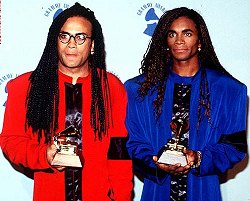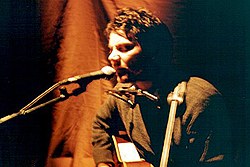George W. Bush: guilty of human rights violations, disregard for international law
The American Prospect has devoted its current edition to human rights abuses under the Bush Administration. Fifteen essays were published in the issue and I recommend reading every one of them. A few choice excerpts are offered below.
From "The Road to Abu Ghraib" by Anthony Lewis:
At its Guantanamo Bay prison camp for alleged terrorists, the United States has renounced its treaty obligations under the Third Geneva Convention. The convention requires that people held as prisoners of conflict be offered individualized hearings before a competent tribunal to determine whether they are rightly held or, as they may argue, were taken mistakenly. President Bush swept that commitment aside by finding that all the prisoners at Guantanamo were “unlawful combatants,” a term not found in the Geneva Conventions. Then his administration argued that the prisoners could not go to U.S. courts to test their detention -- until the Supreme Court rejected that position... Attorney General Ashcroft ordered legal proceedings in the cases of alien detainees held in secret. Families were not told where the detainees were... In our system, freedom depends on commitment to the supremacy of law. Without that commitment, government lawyers can write memoranda justifying torture. Abu Ghraib can happen.
From "A Lawless State" by John Shattuck:
In the Bush war on terrorism, Washington has shown a reckless disregard for basic principles of international human-rights law like the Geneva Conventions, the Convention Against Torture, and the International Covenant on Civil and Political Rights. It has created a climate of lawlessness in which foreign detainees in U.S. custody overseas have been brutally abused, thousands of foreign citizens are held as “enemy combatants” indefinitely without being accorded the status of prisoners of war, and repressive regimes around the world get a green light to crack down on political dissidents and religious and ethnic minorities in the name of fighting terrorism. The result has been a drastic increase in the number of people convinced that America is their enemy and stepped-up recruiting by terrorist groups throughout the Muslim world and beyond... The United States is squandering one of its greatest assets: its commitment to human rights and the rule of law... In the Middle East, local reformers on the ground report that they no longer dare use the words “democracy” and “human rights” in their own communities. On the Arab street, these terms are now synonymous with U.S. military occupation, high civilian casualties, and the abuse of prisoners.
From "Rights in an Insecure World" by Deborah Pearlstein:
The PATRIOT Act became an important first example: It allows the FBI to secretly access Americans’ personal information (library, medical, telephone, and financial records, among other things) without needing to show to an independent authority (like a judge) that the target is particularly suspected of terrorist activity. Yet the September 11 commission’s report and other studies done since the attacks suggest that our primary intelligence failure on September 10 was not having too little information; our problem was failing to understand, analyze, and disseminate the significant quantity of information we had... After September 11, hundreds of foreign nationals in the United States were wrongly detained, unfairly deported, and subject to mistreatment and abuse under government programs, from special registration requirements to voluntary interviews to the detention of those seeking political asylum from a list of predominantly Arab and Muslim countries. Yet an April 2003 Government Accounting Office report on the effects of these interviews revealed that none of the information gathered from the interviews had yet been analyzed for intelligence, and there were “no specific plans” to do so.
From "Inalienable Rights" by Alison Parker:
Immediately after 9-11, the U.S. government questioned thousands of noncitizens of Arab and south Asian descent who were selected for no reason other than their ethnic or religious backgrounds. A full 752 were arrested for routine immigration violations. While none was ever charged with terrorism, the government gave them the slanderous moniker of being of “special interest” to the terrorism investigation...
8-year-old Brazilian Joso Herbert became the adopted son of an American family in 1987. Two months after his graduation from high school in 1997, he sold 7.5 ounces of marijuana to a police informant. Because he was a first-time offender, he was sentenced to probation and community service. But then he was deported to Brazil -- a place where he knows no one and where he no longer understands the language.
From "On America's Double Standard" by Harold Hongju Koh:
Over the past two centuries, the United States has become party not just to a few treaties but to a global network of closely interconnected treaties enmeshed in multiple frameworks of international institutions. Unilateral administration decisions to bend or break one treaty commitment thus rarely end the matter; rather, they usually trigger vicious cycles of treaty violation. Repeated insistence on a double standard creates the damaging impression of a United States contemptuous of both its treaty obligations and its treaty partners, even as America tries to mobilize those same partners to help it solve problems it simply cannot solve alone -- most obviously, the war against global terrorism, but also the postwar construction of Iraq, the Middle East crisis, and the renewed nuclear militarization of North Korea...
In Bosnia, the United States famously “went in heavy” after the Dayton Accords, supporting the entry of 60,000 NATO peacekeepers, including some 20,000 Americans. But in Afghanistan, a significantly larger geographical area, the United States has committed fewer troops to peacekeeping and called for only a small fraction of the international peacekeepers that were sent to Bosnia. The predictable result: While Hamid Karzai nominally acts as president of Afghanistan, outside of Kabul, much of the country remains under the de facto control of warlords and drug lords. Yet instead of making the additional financial commitments necessary to secure Afghanistan and promote serious nation building, the administration initially allocated zero dollars in its 2004 budget for Afghan reconstruction (until embarrassed congressional staffers finally wrote in a paltry line item of $300 million to cover the oversight). To date, U.S. and other international donors have advanced less than half the sums they originally pledged for Afghan reconstruction.
Enough of this hypocrisy. If subscribing to basic human decency is what John Kerry calls a "global test," then I'm all for it.






